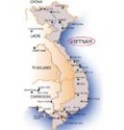Border disputes discussed as Vietnam premier visits China
 Hanoi - Vietnamese Prime Minister Nguyen Tan Dung met with Chinese leaders Wednesday in Beijing to discuss borders and seek to strengthen often-strained ties with China, government officials said.
Hanoi - Vietnamese Prime Minister Nguyen Tan Dung met with Chinese leaders Wednesday in Beijing to discuss borders and seek to strengthen often-strained ties with China, government officials said.
Dung, his wife and a high-ranking government delegation arrived in Beijing Tuesday for his first official visit to China and the seventh Asia-Europe Meeting, which is to be held Friday and Saturday.
Bui Hong Phuc, a former ambassador to China, said the purpose of the visit was to sign an agreement to finish land border demarcation.
Dung also discussed with Chinese Premier Wen Jiabao how to deal with Vietnam and China's dispute over the Spratly and Paracel Islands in the South China Sea, Phuc said.
Unlike Communist Party chief Nong Duc Manh and President Nguyen Minh Triet, Dung chose the United States for his first outbound trip to boost trade and investment with Vietnam's former enemy on the battlefield. Trade with the US accounts for up to 20 per cent of the country's exports while the China market takes 15 per cent.
Last year, Vietnam-China trade increased to more than 15 billion dollars and was expected to hit 21 billion dollars this year.
But Vietnam continues to run a trade deficit with China, which climbed to 3.8 billion dollars in 2006 and 9 billion dollars in 2007. It was predicted to reach 13 billion dollars in 2008.
Vietnam has a close but sometimes strained relationship with its fellow Communist neighbour. China backed Hanoi during its fight for independence and its war with the United States in the
1960s and '70s, but the two countries fought a bloody border war in 1979 and broke off diplomatic relations until 1991.
The two countries continue to dispute the ownership of the Spratly and Paracel Islands in the South China Sea, whose surrounding waters might contain substantial oil deposits.
Vietnam has sought to balance its relationship with China by cultivating close relations with the US, with which it ran a 12-billion-dollar trade surplus in 2007.
Sources close to the US government said they expected Dung's trip to show progress on hot-button issues between the two Asian countries and that they welcomed such progress.
A former senior US official on South-East Asia said he expected the visit to focus on improving trade and economic relations, "an important point given the fairly lopsided imbalance of trade."
Hurdles remain in Hanoi's relations with both countries, including differences on human rights and democracy with the United States and land and sea borders with China. (dpa)